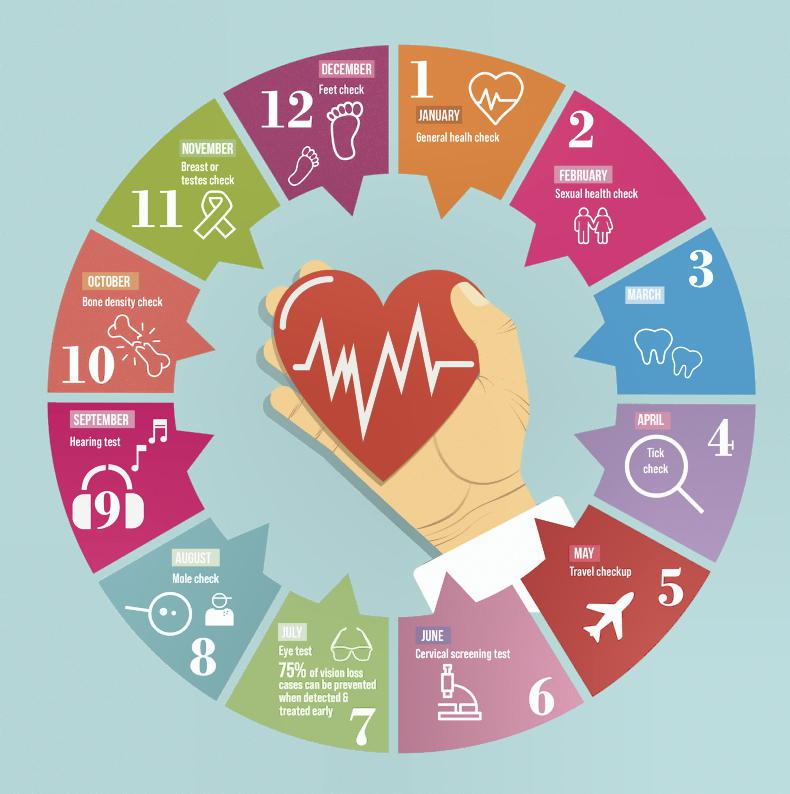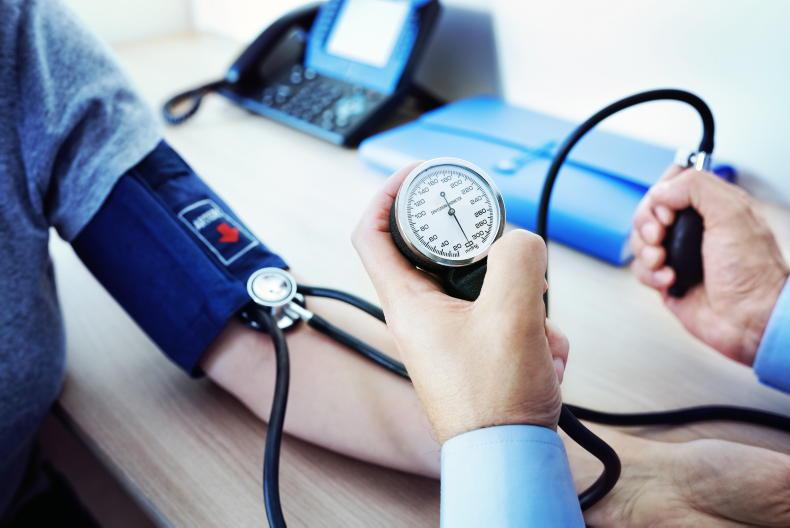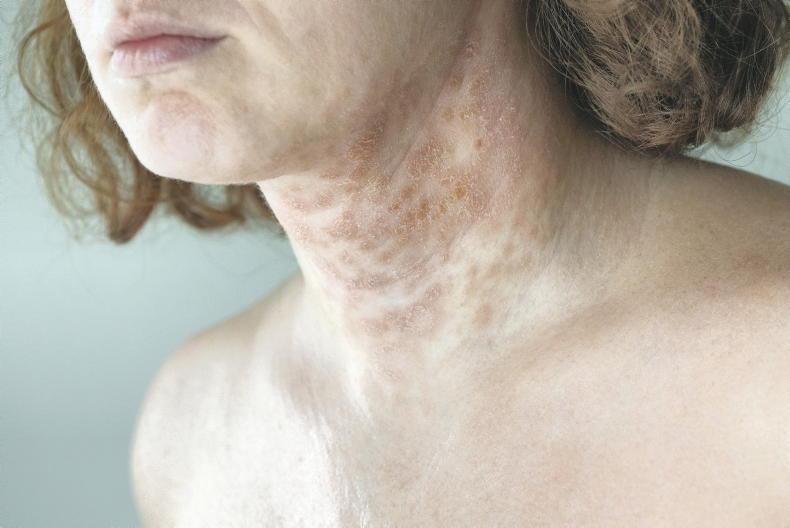
General health check
January is a time when we can feel determined to turn over a new leaf and make positive changes, like losing weight or stopping smoking.Timetabling a health checkup with your GP can also be a great idea and gets more important as each year passes.
A general checkup (usually a 30-minute appointment) will include questions about your lifestyle and family history, BMI measurement, blood pressure check and a blood test (often done ahead of the consultation).
The blood test will include cholesterol and blood glucose level tests to help show your chances of getting heart disease, stroke, kidney disease and diabetes. Women will be reminded about BreastCheck and CervicalCheck appointments and men may have a PSA blood test included (prostate cancer indicator) depending on their age.
Sexual health check
Sexual health is an important part of overall health, the HSE says. If you are sexually active you should be mindful of illnesses such as genital chlamydia.
If you think you have an infection you can be screened free of charge (and confidentially) at clinics nationwide. A list of public STI services is available in the HSE’s Sexual Wellbeing website. Also, some GP practices and family planning services may provide STI testing services for a fee. In a new HSE move, free STI home testing kits are available to those over the age of 17 in some counties, with results within 72 hours. See here for more.
STI home testing kits can also be ordered via online pharmacies or bought over the counter.
Note: While home tests can be useful, seeking professional advice and care is advised as no home test is 100% accurate.
Dental check
Hate going to a dentist? Many of us have a fear of doing so due to negative childhood experiences, but dental visits are not so fear-inspiring now and regular dental checkups will keep your teeth looking good and your mouth healthy. If dental anxiety is putting you off making an appointment see here for information that will explain options that can encourage and reassure.
Tick check
Get used to checking your body for ticks from April onwards if you like to walk in wooded or grassy places with bare legs or arms. Lyme disease is a bacterial infection that can spread from animals to humans via ticks (often carried by deer) and is becoming more common in Ireland.
It can lead to long-term illness if not diagnosed and treated early. To reduce the risk of being bitten, cover up, tuck your trousers into your socks, use DEET-containing insect repellent on your clothes and skin, stick to paths and wear light-coloured clothing so ticks are easier to spot and brush off. Do a body scan for ticks when you return home and remove carefully if affected. Watch out for a bull’s eye rash and flu-like symptoms.
Travel check up
If you are planning to travel, it is advisable to have a travel health check with a specialist company at least one month before you travel so that you can get destination-specific vaccinations, medicines and information. For more information from the likes of the Tropical Medical Bureau, which has clinics around the country, see tmb.ie. COVID regulations at the time of travel may apply also.
Cervical Screening test
Coming up to the age 25? Have you registered for your free cervical screening test? Those with a cervix between the ages of 25-65 are entitled to a free cervical check. Twenty five- to 29-year-olds are invited for a check every three years and 30- to 65-year-olds every five years. This test looks for types of HPV (human papilloma virus) that can cause cervical cancer (and then for abnormal cells if HPV is detected). The previous method of screening was called a smear test and only checked for abnormal cells. If you are on the CervicalCheck register, you’ll get a letter from the HSE when your test is due. It will invite you to make an appointment with a registered GP or clinic.
Eye test
Are you taking positive steps to protect your sight?
Regular sight tests are essential for maintaining healthy eyes, according to the Irish College of Ophthalmologists. Seventy-five per cent of vision loss cases can be prevented when detected and treated early, they say, and a regular eye test can identify early indications of eye diseases such as cataract, glaucoma, diabetes and age-related macular degeneration (AMD).
Healthy adults who do not notice anything obviously wrong with their eyes should still have their eyes tested every two years. If you have a family history of eye problems or have diabetes you should have an examination every year. If you want to know what an eye test involves see here.
Don’t forget that you are entitled to a free eye test every two years and a €42 subsidy toward the cost of frames if you have the required number of PRSI stamps. See information on www.gov.ie on the treatment benefit scheme.
Mole check
Anytime is a good time to keep an eye on moles but you might be more likely to notice changes in the summer when more skin is exposed. Skin cancer is the most common cancer in Ireland, with 13,000 cases diagnosed each year. Ask a partner or friend to photograph your back if necessary and keep the photo so that you can compare images as time goes on.
Remember – skin cancers do not all look the same, the Irish Cancer Society says. They can appear in a number of ways, including any of the following:
A small lumpFlat, red spot.Firm, red lump.A lump or spot that is tender to touch.An ulcer that will not heal.A lump with a scaly or horny top.Rough, scaly patches.A new or changing mole.See your GP if you see any of these changes. See cancer.ie for more information.
Hearing test
One in three adults over the age of 65 has hearing loss. Farmers are particularly prone to noise-induced hearing loss and because it may be gradual you may not notice that you are not hearing the birds sing, the dog bark or a person calling you. So, getting our hearing checked is important. Hearing aids are now very discreet and high tech.
Want to know if you have hearing loss? There are apps available in smartphone app stores that can give you an idea of whether or not you have hearing loss but a hearing test with a qualified audiologist is recommended. Remember that there are grants available for hearing aids under the treatment benefit scheme.
October
Bone density check
Broken a bone recently from a simple trip or fall on cement or ice? If so, being screened for osteoporosis is a good idea, say the experts. In fact, given that most people in Ireland are lacking in vitamin D (needed in combination with calcium for bone growth), the rates of undetected osteopenia and osteoporosis are believed to be quite high, so getting screened is something many people should consider.
While post-menopausal women are at highest risk, men, children and young adults can also develop bone density issues. A DXA scan is painless, takes about 20 minutes and could set your mind at rest. For more information about risk factors and where is best to get your scan, see irishosteoporosis.ie or call them on 01-637-5050.
Breast or testes check
Women should check their breasts for signs of change each month. For details of how to check your breasts properly, visit breastcheck.ie
You will become eligible for BreastCheck breast screening once you reach the age of 50. Your first invitation will depend on when screening is available in your area. This will be within two years of your 50th birthday. Your details should automatically be on the register. You can check that your name is on the register or update your details by calling 1800-45-45-55.
Doctors recommend that men aged 15 to 55 perform a monthly testes self-examination to find any changes. Monthly testicular self-examinations, performed after a warm shower, can help find testicular cancer at an early stage, when it is more likely to be successfully treated.
Feet check
Feet are often forgotten but they are very important. A checkup with a podiatrist can help keep them in ship shape. They can advise and treat conditions like painful feet, thickened or discoloured toenails, warts and verrucas. Podiatrists are also qualified to diagnose and treat mechanical foot problems and can supply and make orthotics. Having your feet checked is very important if you have diabetes.
Read more
Mental health first aid training
What a pain in the neck

General health check
January is a time when we can feel determined to turn over a new leaf and make positive changes, like losing weight or stopping smoking.Timetabling a health checkup with your GP can also be a great idea and gets more important as each year passes.
A general checkup (usually a 30-minute appointment) will include questions about your lifestyle and family history, BMI measurement, blood pressure check and a blood test (often done ahead of the consultation).
The blood test will include cholesterol and blood glucose level tests to help show your chances of getting heart disease, stroke, kidney disease and diabetes. Women will be reminded about BreastCheck and CervicalCheck appointments and men may have a PSA blood test included (prostate cancer indicator) depending on their age.
Sexual health check
Sexual health is an important part of overall health, the HSE says. If you are sexually active you should be mindful of illnesses such as genital chlamydia.
If you think you have an infection you can be screened free of charge (and confidentially) at clinics nationwide. A list of public STI services is available in the HSE’s Sexual Wellbeing website. Also, some GP practices and family planning services may provide STI testing services for a fee. In a new HSE move, free STI home testing kits are available to those over the age of 17 in some counties, with results within 72 hours. See here for more.
STI home testing kits can also be ordered via online pharmacies or bought over the counter.
Note: While home tests can be useful, seeking professional advice and care is advised as no home test is 100% accurate.
Dental check
Hate going to a dentist? Many of us have a fear of doing so due to negative childhood experiences, but dental visits are not so fear-inspiring now and regular dental checkups will keep your teeth looking good and your mouth healthy. If dental anxiety is putting you off making an appointment see here for information that will explain options that can encourage and reassure.
Tick check
Get used to checking your body for ticks from April onwards if you like to walk in wooded or grassy places with bare legs or arms. Lyme disease is a bacterial infection that can spread from animals to humans via ticks (often carried by deer) and is becoming more common in Ireland.
It can lead to long-term illness if not diagnosed and treated early. To reduce the risk of being bitten, cover up, tuck your trousers into your socks, use DEET-containing insect repellent on your clothes and skin, stick to paths and wear light-coloured clothing so ticks are easier to spot and brush off. Do a body scan for ticks when you return home and remove carefully if affected. Watch out for a bull’s eye rash and flu-like symptoms.
Travel check up
If you are planning to travel, it is advisable to have a travel health check with a specialist company at least one month before you travel so that you can get destination-specific vaccinations, medicines and information. For more information from the likes of the Tropical Medical Bureau, which has clinics around the country, see tmb.ie. COVID regulations at the time of travel may apply also.
Cervical Screening test
Coming up to the age 25? Have you registered for your free cervical screening test? Those with a cervix between the ages of 25-65 are entitled to a free cervical check. Twenty five- to 29-year-olds are invited for a check every three years and 30- to 65-year-olds every five years. This test looks for types of HPV (human papilloma virus) that can cause cervical cancer (and then for abnormal cells if HPV is detected). The previous method of screening was called a smear test and only checked for abnormal cells. If you are on the CervicalCheck register, you’ll get a letter from the HSE when your test is due. It will invite you to make an appointment with a registered GP or clinic.
Eye test
Are you taking positive steps to protect your sight?
Regular sight tests are essential for maintaining healthy eyes, according to the Irish College of Ophthalmologists. Seventy-five per cent of vision loss cases can be prevented when detected and treated early, they say, and a regular eye test can identify early indications of eye diseases such as cataract, glaucoma, diabetes and age-related macular degeneration (AMD).
Healthy adults who do not notice anything obviously wrong with their eyes should still have their eyes tested every two years. If you have a family history of eye problems or have diabetes you should have an examination every year. If you want to know what an eye test involves see here.
Don’t forget that you are entitled to a free eye test every two years and a €42 subsidy toward the cost of frames if you have the required number of PRSI stamps. See information on www.gov.ie on the treatment benefit scheme.
Mole check
Anytime is a good time to keep an eye on moles but you might be more likely to notice changes in the summer when more skin is exposed. Skin cancer is the most common cancer in Ireland, with 13,000 cases diagnosed each year. Ask a partner or friend to photograph your back if necessary and keep the photo so that you can compare images as time goes on.
Remember – skin cancers do not all look the same, the Irish Cancer Society says. They can appear in a number of ways, including any of the following:
A small lumpFlat, red spot.Firm, red lump.A lump or spot that is tender to touch.An ulcer that will not heal.A lump with a scaly or horny top.Rough, scaly patches.A new or changing mole.See your GP if you see any of these changes. See cancer.ie for more information.
Hearing test
One in three adults over the age of 65 has hearing loss. Farmers are particularly prone to noise-induced hearing loss and because it may be gradual you may not notice that you are not hearing the birds sing, the dog bark or a person calling you. So, getting our hearing checked is important. Hearing aids are now very discreet and high tech.
Want to know if you have hearing loss? There are apps available in smartphone app stores that can give you an idea of whether or not you have hearing loss but a hearing test with a qualified audiologist is recommended. Remember that there are grants available for hearing aids under the treatment benefit scheme.
October
Bone density check
Broken a bone recently from a simple trip or fall on cement or ice? If so, being screened for osteoporosis is a good idea, say the experts. In fact, given that most people in Ireland are lacking in vitamin D (needed in combination with calcium for bone growth), the rates of undetected osteopenia and osteoporosis are believed to be quite high, so getting screened is something many people should consider.
While post-menopausal women are at highest risk, men, children and young adults can also develop bone density issues. A DXA scan is painless, takes about 20 minutes and could set your mind at rest. For more information about risk factors and where is best to get your scan, see irishosteoporosis.ie or call them on 01-637-5050.
Breast or testes check
Women should check their breasts for signs of change each month. For details of how to check your breasts properly, visit breastcheck.ie
You will become eligible for BreastCheck breast screening once you reach the age of 50. Your first invitation will depend on when screening is available in your area. This will be within two years of your 50th birthday. Your details should automatically be on the register. You can check that your name is on the register or update your details by calling 1800-45-45-55.
Doctors recommend that men aged 15 to 55 perform a monthly testes self-examination to find any changes. Monthly testicular self-examinations, performed after a warm shower, can help find testicular cancer at an early stage, when it is more likely to be successfully treated.
Feet check
Feet are often forgotten but they are very important. A checkup with a podiatrist can help keep them in ship shape. They can advise and treat conditions like painful feet, thickened or discoloured toenails, warts and verrucas. Podiatrists are also qualified to diagnose and treat mechanical foot problems and can supply and make orthotics. Having your feet checked is very important if you have diabetes.
Read more
Mental health first aid training
What a pain in the neck










SHARING OPTIONS